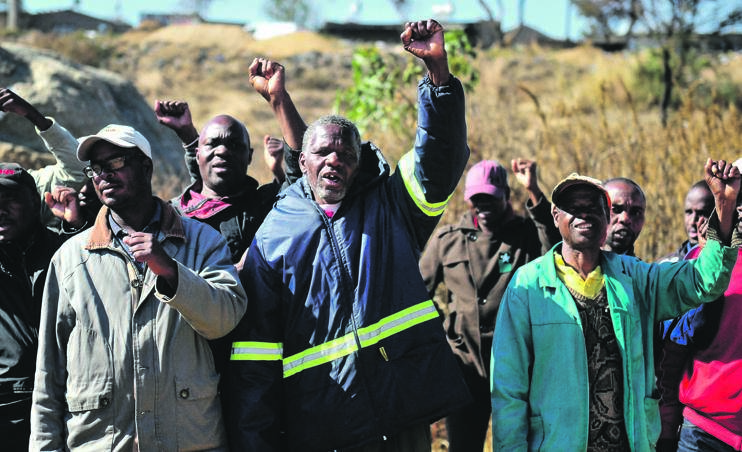
Way back in 1994, workers protested against Midrand council corruption, mainly that they had to buy their jobs, but they were dismissed for their efforts
After 25 years, justice is finally trickling through for survivors of the Midrand council strike and lockout of 1994.
Then, 280 workers had stopped work in protest against claimed corruption, but they were locked out and dismissed, and started what probably qualifies as the longest lockout or strike in domestic history.
Today, 50 have been re-employed by the Johannesburg City Council, along with five next of kin of strikers who have gone into retirement, are too frail to work or have since died.
Other survivors or their offspring are being called to apply to be “re-absorbed” into council work.
In the process, an unlikely duo has emerged to be thanked by the workers for the outcome: the socialist general secretary of the SA Federation of Trade Unions, Zwelinzima Vavi, and the DA executive mayor of Johannesburg, Herman Mashaba.
The re-employment follows years of fruitless appeals to unions and other authorities that saw many of the strikers drift away to seek work elsewhere.
Poverty, disease and death also took their toll, but a core of 55 remained in touch in the Gauteng area.
It was this group of the original seven women and 271 men who elected Stena Molepo as their co-ordinator and who tried, as often as possible, to get together on Sundays.
Molepo, aged 49, is one of the youngest of the original group to be re-employed. Most are in their fifties, while the eldest is 72-year-old Xegondini Milton Madlavu.
The five next of kin who have been employed range in age from 27 to 31 and include Given Boshoma, the 31-year-old son of Matee Boshoma, the Midrand shop steward, now in retirement, who played a leading role in the 1994 protest.
Their major complaint at the time was that workers had to buy their jobs with the council.
According to affidavits supplied by workers, they usually paid R120 – a goodly sum pre-1994 – to secure work as general labourers. Workers with better qualifications who qualified for higher-paid jobs, paid more.
Older workers confirm that this was a fairly common — and deeply resented — practice during the apartheid era. But with a new, democratic dispensation looming and militant trade unionism on the march, the workers were spurred into action.
They saw this as the new dawn.
Unfortunately, it was a time of considerable political turmoil and when the Labour Relations Act and other progressive legislation still lay in the future.
But, full of hope and determined to claim their rights as citizens of the coming democracy, the workers demanded an end to corruption and the sacking of those responsible for it.
When their demands were ignored, they marched in protest.
Management responded by locking them out, declaring their action an “illegal strike” and dismissing them.
It didn’t take very long before the dreams and hopes of many of the 280 were shattered. In the greater scheme of things their valiant stand against corruption and for a better future was largely ignored.
Over the years, promises were made and broken, investigations promised and sidelined.
At the same time, the locked out workers observed individuals from the Midrand management, whom they considered to be politically well connected and some perhaps even corrupt, rise to greater wealth and prominence.
Many also complained that they had not received adequate — or any — payment from their pension and provident funds.
Especially galling in the later years was the fact that the administration of the municipal workers’ pension fund was taken over by a company headed by the former Midrand human resources manager.
However, the core group continued trying to raise their issues although there were other calls on their time, not least in having to earn a living.
As late as 2016, for example, Molepo, the young matriculant from Nthabiseng township in Limpopo and spokesperson for the Midrand group, convened the May Day rally in Tembisa, Gauteng, featuring the National Union of Metalworkers after its expulsion from Cosatu.
He also helped organise the “Zuma must go” protest outside the Gauteng legislature.
Now, a quarter of a century later, the initial demand of the workers — reinstatement — has been met, thanks to the inclusion of the “next of kin” provision.
This follows the precedent set after the massacre of striking miners at Marikana in 2012 where it was agreed that the jobs of miners killed could go to family members.
The Midrand group is also pressing ahead with the demand for a full investigation into the pension and provident funds of the former Midrand workers.
In addition, they have held meetings with General Shadrack Sibiya, head of the City of Johannesburg’s anti-corruption unit, providing him with affidavits and what evidence exists of the corruption that triggered their protest, lockout and dismissal.
After a quarter of a century, the wheels of justice have certainly turned very slowly.
Whether they will yet grind very fine remains to be seen.




 Publications
Publications
 Partners
Partners









